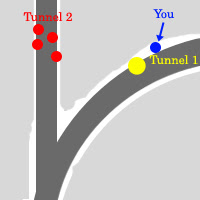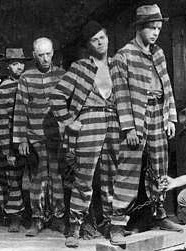Ethics
Some of you have probably seen questions similar to these before, they're not an uncommon field in psychology, but still a curiousity. Likely some of the few people who come to this site will never come again after this list of questions.
Question 1
A. You and a team of five other laborers are doing maintenance work on an old, narrow subway track junction. You are teamed up with Fat Bob down tunnel number 1, working on the magneto-electric switch mechanism that toggles incoming trains between the tracks. The other workers are in tunnel number 2.
Although the track is supposed to be shut down you look up and see a bright light accompanied by the rumbling sound of an approaching train.
Currently, the tracks are switched to send the train down tunnel number 2, which will kill the other four laborers (the track is too narrow for them to evade the train).
You can toggle the lever and switch the train to track number 1, however, the tunnel is narrow enough it will almost certainly kill Fat Bob as he won't be able to hug the wall like you can to survive. Do you flip the lever?
Do you flip the lever?
B. If you decided to flip the lever, you have discovered that the lever doesn't work. However, you know the tracks are switched by a connecting electric current between them, and if you push Fat Bob (who is paralyzed with fear currently) onto the track, he will bridge the circuit and toggle the track over to tunnel 1. Of course, if he isn't killed by the electric current, the subway will surely get him, but the other laborers would be saved.
Do you push Fat Bob onto the track?
C. There isn't enough room for you to squeeze against the wall and survive, switching the train will kill both you and Fat Bob.
Would you switch the train to save four others?
D. The group of 4 laborers who are down Tunnel 2 are all violent, degenerate criminals, you and Fat Bob are here supervising their work and keeping track of the chain-gang.
Would this change any of your decisions?
Question 2
A. Jill is a college senior who decides she wants to take a trip to Amsterdam for Spring Break to meet up with her one-year older brother Bob (not Fat Bob) whom she hasn't seen since she was 12.
They visit together and have a great time catching up on everything that has happened to both of them in the intervening 10 years.
When it's time to call it a night Jill asks Bob if he wants to come up to her Hotel room instead of heading home across town; Bob accepts.
Jill and Bob decide they want to have sex, Jill is on birth control, but just to be safe, Bob also uses a condom.
Is this wrong? Why?
B. You are Jill's friend from college and are taking the trip to Amsterdam with her. You sit through the dinner at the restaurant, which is strangely uncomfortable, and towards the end you hear Jill and Bob discussing what sounds like plans for a sexual tryst.
What do you do about it? If anything?
Question 2.5
A. Jill and Bob are a happily married couple with a healthy 5 year old son. You are Jill's friend back from her college days and you still visit every couple of months. While preparing a present for Jill's mother (you work in the genealogy field) you have discovered that Jill and Bob, unbeknownst to them, are brother and sister, separated at birth.
What do you do?
B. Jill and Bob have no children, Jill had to have a hysterectomy just after high school and can never have children. You make the same discovery as scenario 2.5-A.
What do you do?
Question 3
A. The Munji family lives in somewhat rural Nebraska, and has a fine, large, healthy dog named Biscuit. There are two sons and a daughter in the family, ages 12, 10, and 8 years old. The family isn't wealthy, but they do have a somewhat prosperous small farm that they operate together and they don't really ever have to do without.
Biscuit. There are two sons and a daughter in the family, ages 12, 10, and 8 years old. The family isn't wealthy, but they do have a somewhat prosperous small farm that they operate together and they don't really ever have to do without.
One day Biscuit offends the farm's bull overmuch and is kicked in the head and killed.
The family is very saddened by the loss of Biscuit.
Is it okay for them to safely prepare and eat the remains of Biscuit?
B. The Munji family remains the same, except they live in a turbulent and impoverished part of Africa and frequently must go weeks at a time with little or no food. Their belief system precludes them from killing their one scrawny cow or their dog Biscuit (in their native language).
One day the cow steps on Biscuit while Biscuit is sleeping and kills Biscuit.
Is it okay for this Munji family to eat Biscuit?
C. The same Munji family as B is no longer precluded from killing their livestock by a belief system. The cow, although scrawny, still produces some milk while Biscuit doesn't really do much of anything besides provide companionship.
Should the Munji family kill and eat the cow, Biscuit, or neither?
Anyone else have any good ethical brain twisters?